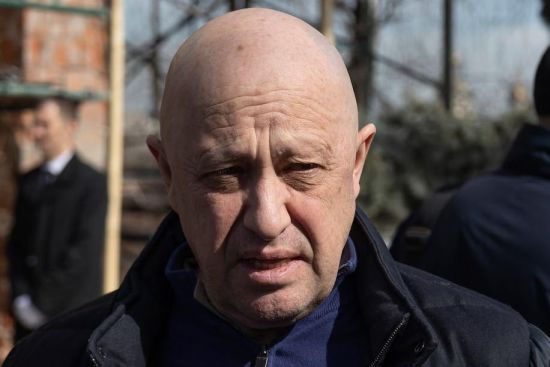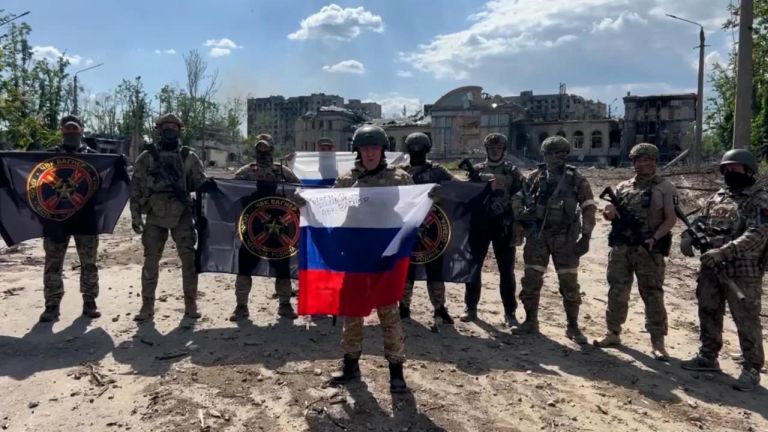By Eric Vandenbroeck
and co-workers
1917 Redux?
Fresh off his claim
of victory in capturing the Ukrainian city of Bakhmut, Russian mercenary boss Yevgeniy
Prigozhin warned that Moscow’s brutal war could
plunge Russia into turmoil similar to the 1917 revolution unless its
detached, wealthy elite became more directly committed to the conflict.
In a lengthy
interview with Konstantin Dolgov, a political
operative and pro-war blogger, Prigozhin, the founder
and leader of the Wagner mercenary group, he was also asserted that the war had
backfired spectacularly by failing to “demilitarize” Ukraine, one of President
Vladimir Putin’s stated aims of the invasion. He also called for totalitarian
policies.
In recent days Moscow
suffered embarrassment when a group of anti-Putin Russians entered the Belgorod
region in an incursion that caused anger and confusion among Russia’s
influential military analysts. Asked about the incident, Prigozhin
said Russian defense forces are “absolutely
not ready to resist them in any shape or form.”
“We are in a
situation where we can simply lose Russia,” Prigozhin
said, using an expletive to hammer his point. “We must introduce martial law.
We, unfortunately … must announce new waves of mobilization; we must put
everyone capable to work on increasing the production of ammunition,” he said.
“Russia needs to live like North Korea for a few years, so to say, close the
borders … and work hard.”
Citing public anger
at the lavish lifestyles of Russia’s rich and powerful, Prigozhin
warned their homes could be stormed by people with “pitchforks.” He singled out
Ksenia Shoigu, the daughter of Defense Minister Sergei Shoigu, who was spotted
vacationing in Dubai with her fiancé, Alexei Stolyarov,
a fitness blogger.
“The children of the
elite shut their traps at best, and some allow themselves a public, fat,
carefree life,” Prigozhin said in the interview
released Wednesday on video. “This division might end as in 1917, with a
revolution — when first the soldiers rise up, and then their loved ones follow.”
Prigozhin, who earned a fortune and the nickname “Putin’s chef”
off government catering contracts, seized a central role in the war in Ukraine,
first by deploying his mercenaries on the front lines and later by recruiting
heavily from prisons to bolster Moscow’s depleted forces. In the interview, Prigozhin said that he did not know how to cook and that
journalists should have called him “Putin’s butcher.”

Wagner led the
onslaught in Bakhmut, which culminated in Putin putting the city under Russian
control this week — his first significant territorial gain since last summer.
Ukraine insists it is still fighting on the city’s outskirts.
But while Prigozhin’s role in Bakhmut has given him a significant
platform, he has been engaged in a nasty running feud with Shoigu and other
Russian military commanders, accusing them of denying Wagner needed ammunition.
He also repeatedly threatened to withdraw from Bakhmut.
In the interview with
Dolgov, Prigozhin professed
to be guided by love for his motherland and loyalty to Putin. But he also
delivered blistering criticism of the war, which the Kremlin calls a “special
military operation.”
Instead of
demilitarization, he said, the invasion turned “Ukraine’s army into one of the
most powerful in the world” and Ukrainians into “a nation known to the entire
world.”
“If they,
figuratively speaking, had 500 tanks at the beginning of the special operation,
now they have 5,000,” he said. “If they had 20,000 fighters who knew how to
fight, now they have 400,000. How did we ‘demilitarize’ it? Now it turns out
that we militarized it — hell knows how.”
Prigozhin this week again said that his fighters would leave
Bakhmut, potentially in a bid to leave Shoigu responsible for holding the city,
which Kyiv insists it will retake.
In the interview, he
had particular venom for the elite's children and the many wealthy Russians who
have tried to avoid letting the war disrupt their lives. Prigozhin,
however, did not comment that this effort to shield Russians has been a central
strategy of Putin since the invasion started.
Prigozhin said that the grief of “tens of thousands of
relatives” of killed soldiers might reach a boiling point, and the Russian
government will have to contend with broader anger and discontent, exacerbated
by economic disparity.
Prigozhin (center) has claimed that his Wagner forces captured
Bakhmut after a months-long struggle that caused vast amounts of Russian losses.

“My advice to the
Russian elites — get your lads, send them to war, and when you go to the
funeral, when you start burying them, people will say that now everything is
fair,” Prigozhin said in the interview.
Prigozhin’s rants often undermine Moscow’s official line and
almost certainly would result in harsh punishment for anyone else. The country
has outlawed criticism of the military, and many citizens have faced
prosecution.
While regular Russian
military officials keep a lid on the number of casualties in Ukraine, Prigozhin said that 20,000 Wagner fighters had died in the
battle for Bakhmut. Even if an undercount, the figure eclipses the last
official number given by Moscow in September, when Shoigu claimed that 5,937
soldiers had died.
Military experts
attribute such a high death toll among Wagner fighters to its commanders’
brutal tactics of sending waves of poorly trained convicts to exhaust
Ukrainians, sometimes threatening the prisoners with death if they retreated.
Private military
companies are technically illegal in Russia, but Prigozhin
has operated with impunity, deploying his fighters to countries in the Middle
East, Africa, and Ukraine. In Mali, Wagner soldiers are suspected of war crimes
following reports of executions, torture, rape, and abductions.
While Prigozhin has sought to cultivate an image of himself as a
fighter, appearing in full battle gear on the front lines in countless videos,
he falls squarely among the Putin cronies who have become billionaires off
their government connections and contracts. Like his fighters, however, Prigozhin is also an ex-convict: He spent most of the 1980s
in jail for robbery.
So far, Prigozhin remains unmatched in publicity, succeeding where
some regular commanders have stumbled, in some cases in humiliating fashion. Ukrainian
officials have denied any suggestion that they would leave Bakhmut. The Institute for
the Study of War said
that Ukrainian troops are “continuing to inflict high casualties” on Russia’s
military and mercenary forces in Bakhmut. Still, the Ukrainian troops may be
conducting a “limited fighting withdrawal” from the area. The fighting is so
intense that forces have sometimes clashed hand-to-hand, including fistfights,
Dmytro Vatagin, a Ukrainian soldier stationed near
Bakhmut, said in an
interview.
Military experts, for
example, pointed to a staged clip of Gen. Col.Alexander
Lapin that emerged Tuesday, showing him commanding a small group of troops to
fight off a mysterious two-day incursion in the Belgorod region, a staging area
for Russian forces that borders Ukraine.
The clip, in which
Lapin is seen walking alongside a convoy of armored vehicles shouting, “Go
forward, guys! For the motherland,” was ridiculed by some Russian pro-war
bloggers as “embarrassing” and “laughable.” Local officials, meanwhile, fought
off questions from civilians alarmed about a breach in the border.
“I have even more
questions for the Defense Ministry than you have,” Belgorod Gov. Vyacheslav
Gladkov said in a live question-and-answer session with residents after
militias made up of Russians fighting on Ukraine’s side in the war stormed a checkpoint
in Grayvoron district and infiltrated nearby
villages.
Gladkov said Tuesday
that one woman died while evacuating during the attack, and eight people were
injured. Russian officials claimed to repel the attacks, while the militias
responsible said on Wednesday that they were still actively fighting inside
Russian territory.
“We are living in a
challenging period,” Gladkov said in a separate statement.”
The disruptions in
Belgorod continued Wednesday, with multiple drones targeting a gas pipeline and
residential buildings, Gladkov said.
In his interview, Prigozhin said there was an “optimistic scenario” for
Russia’s war: Western support for Ukraine wears out, and China brokers a peace
deal, allowing Russia to keep occupied Ukrainian lands.
“I don’t have much
faith in the optimistic scenario,” he said, adding that instead, Ukraine could
partially succeed in a highly anticipated counteroffensive, pushing Russian
troops closer to the borders that existed before hostilities began in 2014. He
said they could also attack Crimea and continue pressing on in the east, armed
with more Western weapons.
“Most likely, this
scenario will not be good for us,” Prigozhin said.
“So we need to prepare for a difficult war.”
For updates click hompage here